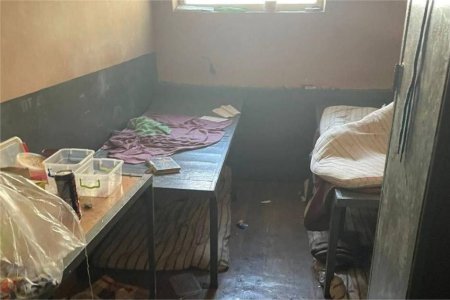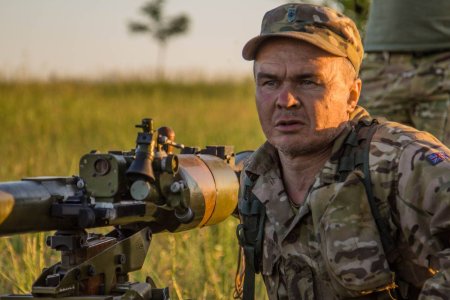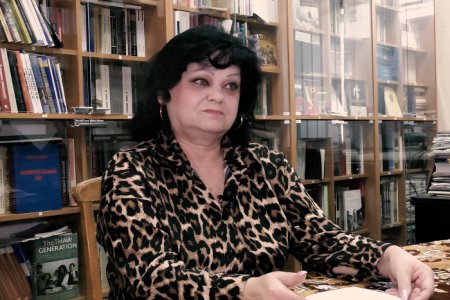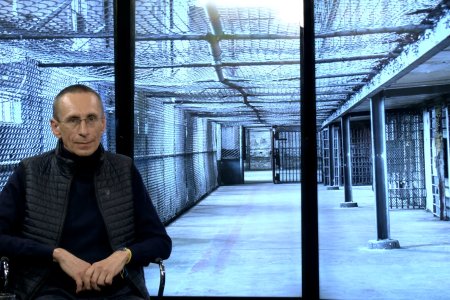My name is Ruslan. I live in the village of Dmytrivka, Kyiv-Sviatoshynskyi district; I am engaged in car repairs.
Do you remember what the first day of the full-scale invasion of the Russian Federation was like for you?
My eldest daughter is studying in Kyiv; she called me at half past five in the morning and said: “Dad, the war has begun!” I woke up my family, went outside, looked towards Kyiv, and saw the glow. I told my daughter to get ready and come to us. That was the beginning.
What happened in the following days?
In the following days, chaos gradually began. People began to leave, and there were gas station queues, so refueling was impossible. By the way, I still did not fully believe something serious could happen. But my nephew lived in the Borodiansky district, in the village of Zdvyzhivka. At that time, the orcs [Ukrainian name for the Russian army] were already there with more than 600 pieces of equipment. So, my nephew called me and said the Russians would most likely move through Borodianka in our direction.
They reached us in about four days. There is a village nearby called Cuba (or Dmytrivka-1), where the Russians had an office, and here, at the beginning of the street, they occupied two houses: they lived in one, and their observation post was in the other.
Did you stay in the village during the occupation of Dmytrivka?
Yes, I stayed here. On 5 or 6 March, I sent my family to the Khmelnytskyi Region while I stayed here.
Were there any problems during the evacuation?
Evacuation is generally a very complex process. Of course, there were problems, there were queues, there were delays. People were gathered in crowds, they left in columns, there was a panic, and many bad things happened during the panic.
Why didn’t you evacuate?
The first reason is the property. Three houses, they all had to be looked after. And secondly, I’m not the kind of person to run from them [Russians]. In total, 10-12 of us left here in the village, so we stayed here.

What happened in Dmytrivka during the occupation?
I’ll tell you honestly: those Russians in Dmytrivka were more or less adequate. However, those stationed along the highway in the “Grandmother’s Garden” complex were cracked. Neither the bodies of the dead could be taken away from there, nor could an agreement be reached. And those who were here, to be honest, did not even loot. There was such a case when I went to my father-in-law to feed the dog and chickens. I returned, opened the door, entered the house, and found four Russian military men from 19 to 45 years old.
They asked who I was. I replied I am the house owner and began to drive them out. I tried to kick them out of the yard. Then the gate opened, and four more came in. They asked for a bottle of water and some cereal. I didn’t give them cereal, but I gave them water, realizing it made no sense to get a bullet in the head because of twenty liters of water. They left and didn’t come back.
Were you afraid to kick them out?
What should I be afraid of if they broke into my place?! Besides, if they wanted to kill, they would have killed immediately.
Are you aware of Russian war crimes in Dmytrivka or in the villages nearby?
Yes, many things happened ... They killed people right on the highway. I don’t remember the date; it was the first or second day after they were kicked out of here. We were driving along the road towards Makarov — five adult men, and what we saw left us speechless: burned cars, murdered women, men ... 200 bodies were collected within two weeks — from a traffic light in Stoianka to UPG gas station. Many acquaintances and friends died. They were just shot.
One of the stories is about the Borodianskyi district, the village of Zahaltsi. I come from there. So, a local man, two years older than me, fought in the ATO [Anti-Terrorist Operation] in 2014. His sons — one is 19, the other — 21, went to war, and he is also at the front now. The Russians, having learned about this, raped his wife for a week, and now she has mental health problems because of the experience.
Next to us is Zabuchchia. There, people who worked in law enforcement agencies and pensioners were placed in front of military equipment as a human shield so that our army could not shoot.
Were there direct combat clashes between the Armed Forces of Ukraine and the Russians in Dmytrivka?
Certainly, in Dmytrivka, it was one of the most significant battles in the Kyiv region. At that time, I was not here; I was returning from Western Ukraine. Nobody was allowed in here. But people remained here, and they told me how it was. Our tankers did their job 100%. About 25 units of Russian equipment were burned here. They were surrounded from the side of the Zhytomyr highway and the side of Bucha. The first military people who came here were the Bulat Battalion and the Georgian Legion.
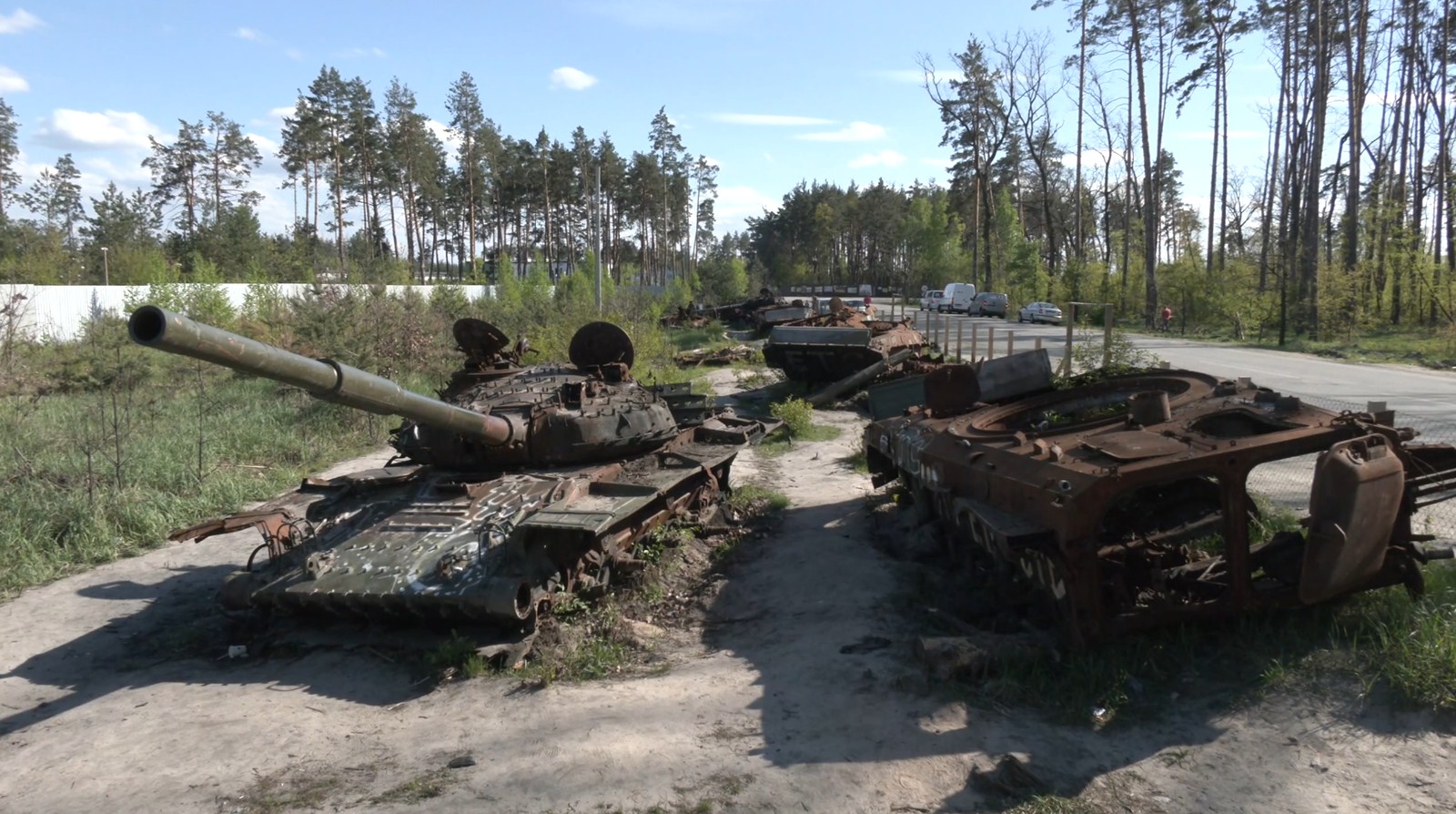
What Russian units were in Dmytrivka?
The Marines were. It was in Dmytrivka that the marines were.
Where were they from?
Among those in my yard were four Russians, that is, of Slavic appearance, and four Buryats. And they weren’t appropriately dressed.
One wore the “Afghanka” [a slang name for a set of field uniforms], which seems to be from the 80s. There was -15 [Celsius] on the street, but he wore ordinary sneakers. This is their Marine Corps. But they had good weapons. They were “charged” in full.
How many houses in Dmytrivka suffered from shelling?
Many houses have already been rebuilt. Here on our street, five homes were destroyed and then rebuilt. In general, in the village — very many, a lot.
What happened after the de-occupation in Dmytrivka?
Honestly, it was a scary sight — many destructions and fragments all around, which I still find in my yard.
Has your property been damaged?
No, my property was not damaged. Well, some little things, but I think it’s not worth the attention.
How did you start volunteering during the occupation?
Let’s just say I was asked to deliver a cargo from Western Ukraine to Boiarka, to a children’s clinic. I agreed, and we went on the first trip — Mukachevo-Uzhhorod. We were on the road for a week, arrived, unloaded, and they drove me back to Dmytrivka. “Drove” is too strong a word. There was no way to move along the road. Therefore, conducting a real “special operation” was necessary to leave and then return.
My guys drow me across the highway, there I was met by the police, drove to Bilohorodka, in Bilohorodka I changed into the next car, went to Boiarka, in Boiarka I changed into a third car, they took me to the truck, and then I drove to the right place. I brought help to Dmytrivka, Boiarka, and Moschun. I delivered many things: we carried medicines, accompanied the cargo, and brought many other things.
Did you have any problems with the Russians during these trips?
No, because we drove so that they did not see us. We passed only our checkpoints. And I tried to go to Dmytrivka at night so the Russians would not notice me.
Could you have thought that a full-scale war would begin?
I’ll tell you honestly — yes. My friends and I often met before the war and discussed whether there would be a war. And everyone was inclined to think it would be. We just felt that he [Putin] would simply cut off the sea from us, and that was it.
Have you prepared an emergency go bag?
No. I’ll tell you more: I even took my family out of here only when the rockets began to strike. They didn’t want to leave at all.
Has your attitude towards Russians changed?
I never respected them, to be honest. They are not our brothers, and it is generally difficult to call them people.
